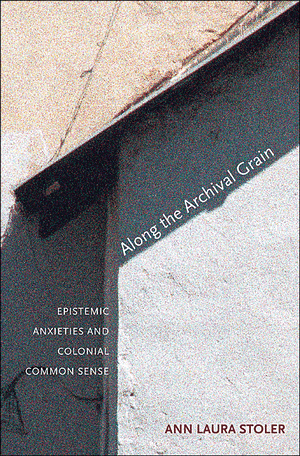Ann Laura Stoler: Along the Archival Grain: Epistemic Anxieties and Colonial Common Sense (2010)
Filed under book | Tags: · archive, colonialism, ethnography, governance, history, politics

“Along the Archival Grain offers a unique methodological and analytic opening to the affective registers of imperial governance and the political content of archival forms. In a series of nuanced mediations on the nature of colonial documents from the nineteenth-century Netherlands Indies, Ann Laura Stoler identifies the social epistemologies that guided perception and practice, revealing the problematic racial ontologies of that confused epistemic space.
Navigating familiar and extraordinary paths through the lettered lives of those who ruled, she seizes on moments when common sense failed and prevailing categories no longer seemed to work. She asks not what colonial agents knew, but what happened when what they thought they knew they found they did not. Rejecting the notion that archival labor be approached as an extractive enterprise, Stoler sets her sights on archival production as a consequential act of governance, as a field of force with violent effect, and not least as a vivid space to do ethnography.”
Publisher Princeton University Press, 2010
ISBN 0691146365, 9780691146362
314 pages
PDF (updated on 2016-10-13)
Comments (4)Michael Hardt, Antonio Negri: Commonwealth (2009) [English/German]
Filed under book | Tags: · activism, commons, globalisation, governance, politics, revolution

When Empire appeared in 2000, it defined the political and economic challenges of the era of globalization and, thrillingly, found in them possibilities for new and more democratic forms of social organization. Now, with Commonwealth, Michael Hardt and Antonio Negri conclude the trilogy begun with Empire and continued in Multitude, proposing an ethics of freedom for living in our common world and articulating a possible constitution for our common wealth.
Drawing on scenarios from around the globe and elucidating the themes that unite them, Hardt and Negri focus on the logic of institutions and the models of governance adequate to our understanding of a global commonwealth. They argue for the idea of the “common” to replace the opposition of private and public and the politics predicated on that opposition. Ultimately, they articulate the theoretical bases for what they call “governing the revolution.”
Though this book functions as an extension and a completion of a sustained line of Hardt and Negri’s thought, it also stands alone and is entirely accessible to readers who are not familiar with the previous works. It is certain to appeal to, challenge, and enrich the thinking of anyone interested in questions of politics and globalization.
Publisher Harvard University Press, 2009
ISBN 0674035119, 9780674035119
330 pages
PDF [English] (updated on 2012-7-27)
PDF [German] (added on 2012-7-27)
Paul B. Hartzog: Panarchy: Governance in the Network Age
Filed under paper | Tags: · commons, governance, network culture, panarchy, peer production, politics, social movements
Paul Hartzog introduces the concept of panarchy, a sociopolitical field that emerges when connective technologies, which lower the threshold for collective action, enable cooperative peer-to-peer production – of knowledge, of tools, of power.
More info (author)
Comment (0)
